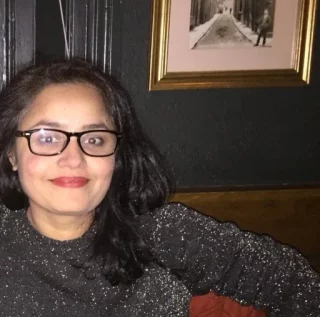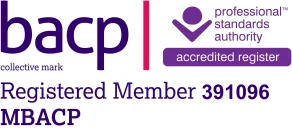Wajda Tabassum Counselling
A confidential space to explore the thoughts, feelings and challenges in your life
Welcome!
Thank you for visiting my website.
I am Wajda and I am a BACP (British Association of Counselling and Psychotherapy) Registered Counsellor (Registration Number: 391096). I am a therapist providing short and long-term therapy, remote and in-person sessions to Adult Individuals, Children and Young People, Couples as well as Family Therapy and Pre-Trail Therapy.

I am a qualified counsellor trained in Humanistic Counselling. In my private practice based in West London, I offer a safe and confidential space to express and explore experiences, feelings, and struggles. I am a multilingual counsellor and can offer session/s in English, Urdu, or Hindi. My sessions are co-created therapeutic spaces for my client.
I encourage authenticity, empathy, integrity and respect towards self and others.
MY APPROACH
I use various methods, interventions and activities in the sessions if a client sees that it can be beneficial to explore and make meaning. I explore with my client/s what they feel comfortable with and what can be beneficial to them. I use creative approaches throughout the therapeutic journey using grounding, mindfulness, and metaphors, to explore and make meaning.
People come to me for help a wide range of issues. Here are a few of the more common difficulties that can be supported through counselling:
Feelings of stress or anxiety
Panic attacks
Relationship problems
Grief, loss or bereavement
Problems with addiction
Trauma and post-traumatic stress
Abuse
Depression
Problems with confidence or self-esteem
Anger management
Issues relating to sexuality
Difficulties at work or in retirement
Problems with family or school life
Diverse Counseling Approaches
Some of the other approaches I might use according to the needs of the client are IFS (Internal Family System), Attachment Theory, Psychosocial Development approach, Inner Child approach, Creative Experiential Activity, Emotionally Focused Therapy, Existential Therapy, Solution-focused brief therapy, Relationship Therapy/using attachment style approach, Coaching, Psychoeducation Approach to Therapy, CBT, Narrative approach.
Courageous Steps Forward
It takes courage to work on concerns and struggles, however, reaching out to counselling/therapy can be a step forward to the shift and change you are looking for to have a more fulfilling life. If you are ready to work on your concerns and struggles, I am here to offer support and be with you as we work through the empowerment.
I look forward to working with you!
CONTACT ME
Feel free to contact me if you have any questions about how counselling works, or to arrange an initial assessment appointment. This enables us to discuss the reasons you are thinking of coming to counselling, whether it could be helpful for you and whether I am the right therapist to help.
You can also call me on +44 7506 166508 if you would prefer to leave a message or speak to me first. I am happy to discuss any queries or questions you may have prior to arranging an initial appointment.
All enquires are usually answered within 24 hours, and all contact is strictly confidential and uses secure phone and email services.
session information
In-Person, Online, Phone, Outdoor counselling from
Uxbridge, West London.
Free 20 minutes initial consultation over the phone
50-minute Individual Counselling Session
£65.00 per session
65- minute Couple Counselling Session
£75.00 per session
Concessions offered for:
Low income, Students, Unemployed, Trainee Counsellors, Refugees
FREQUENTLY ASKED QUESTIONS
Counselling is usually a good way to help with a current problem; something that can be discussed and - hopefully - resolved within a limited number of sessions. Over a certain number of weeks the understanding of the problem improves and away forward becomes clear. Therapy often describes work that goes a bit deeper, towards more substantial life issues and problems having a deeper effect on the client’s life. Therapy often requires a long-term approach, so the number of sessions can be open-ended.
Which option is most suitable depends on the client and the difficulties they are facing. In some cases counselling works well as an ongoing, longer-term option - or therapy can manage to resolve an issue in just a few sessions.
How long a period of counselling lasts will vary from person to person and depend on the depth of the issues they are facing. For some people a couple of sessions helps to bring their problems into focus, and they feel ready to move forward; other problems may require more of an open-ended approach.
Before we begin any work we will agree on the number of sessions we’ll undertake, and at the end of that number review our progress. As long as we both agree further therapy will be of benefit to you, sessions can continue.
My aim is to offer a first appointment - known as an initial assessment - within 1-2 weeks. Then we would arrange a set number of counselling sessions to take place at the same time every week, that is convenient for you and where I have availabity. How quickly these sessions can begin will depend on the availabity of that free ‘slot’.
Everything that is said within the counselling room is private - this is one of the main ways counselling and therapy differ from talking to a friend or relative. Once you are comfortable with the format of weekly sessions and the safe space they provide, you will find the freedom to speak in confidence is of great value.
Note that there are some situations where you may be a risk to yourself or others, and there the law requires that I notify an authority; in these cases I may not be able to keep total confidentiality. Breaking confidentiality is very rare though, and only happens after the person concerned has been informed.
Usually I am asked this question by people who are nervous about entering into counselling, or when they are looking for support in coming to see a therapist. This anxiety is understandable, but a key aspect of therapy is that you should feel free to talk about any issues you feel are important to you. Having someone else with you who can be connected those issues makes this opening-up more difficult, so for this reason I do not see clients accompanied by friends or family.
